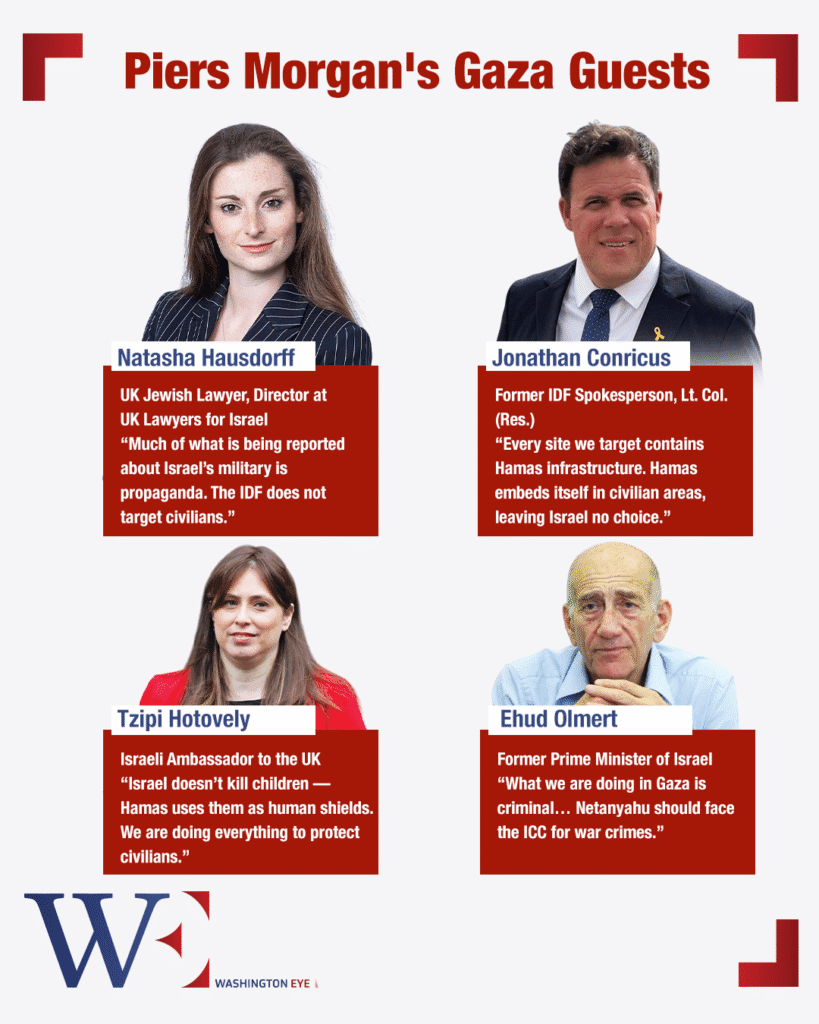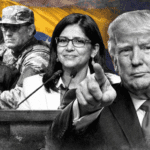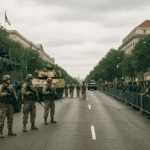by: The Washington Eye
Piers Morgan has never been one to hold his tongue. When Hamas militants launched their barbaric October 7, 2023 attack on Israel – killing around 1,200 people and taking scores of hostages – Morgan’s reaction was swift and fierce. “I support Israel’s right to defend itself after the terror attacks of Oct 7,” he declared, echoing a sentiment widely shared in the West. In the early weeks of the war, Morgan used his platform to emphatically back Israel’s retaliation against Hamas. He grilled guests like former UK Labour leader Jeremy Corbyn to condemn Hamas as terrorists, and he gave ample airtime to pro-Israel voices. His posture then was that Israel not only had a right but an obligation to strike back. Any suggestion of restraint sounded, to Morgan’s ears in October 2023, like an affront to justice after such atrocity.
Yet as the war’s grim toll mounted, Morgan’s stance began to evolve – dramatically. Fast forward to mid-2025, and the Piers Morgan we see is no longer offering Israel a blank check of support. Instead, he’s on prime time angrily challenging Israeli officials about the thousands of Palestinian civilians killed in Gaza, and lambasting what he calls a war that has “crossed a line”. Over a tumultuous year and a half, Morgan’s journey on the Gaza conflict has morphed from staunch defender to outspoken critic. The evolution has played out through a series of fiery interviews on his show Piers Morgan Uncensored, and it reflects a broader reckoning with the humanitarian catastrophe unfolding in Gaza. Along the way, Morgan’s own platform – a high-profile TV perch once known for its unabashed pro-Israel slant – has transformed into something far more unpredictable and, to some, jarringly critical of Israel’s conduct.
Defending Israel’s “Right to Self-Defense” – At First
In the immediate aftermath of Hamas’s attack, Morgan’s tone was unambiguously pro-Israel. Like many, he was horrified by Hamas’s slaughter of Israeli civilians. He insisted Hamas must be crushed. He praised Israel’s initial decision to go to war, arguing it was a legitimate act of self-defense. On his social media, Morgan ridiculed anyone who equivocated about Hamas’s brutality. “Israel had to defend itself after that horrific attack on October 7th,” he maintained.
During those early weeks, Morgan’s show often featured Israeli officials and advocates who found a friendly forum. He spoke with people like Tzipi Hotovely, Israel’s ambassador in London, in a manner at first respectful of Israel’s position. Morgan’s style with pro-Palestinian guests, by contrast, was confrontational – he pressed them to denounce Hamas and acknowledge Israel’s victimhood. This was Morgan in “fierce defender” mode. The man who once hosted a CNN show and co-hosted Good Morning Britain was now on a new global platform (TalkTV’s Uncensored show, also carried on Fox Nation in the U.S.), and initially he seemed to wield it to bolster Israel’s narrative.
But cracks in Morgan’s confidence appeared as civilian casualties in Gaza climbed relentlessly. From late 2023 into 2024, images of flattened neighborhoods and bloodied children filled the news. Morgan, ever attuned to headline-grabbing controversy, began asking tougher questions. What was a proportionate response to October 7? How many children in Gaza must die in the name of fighting Hamas? By December 2023, Morgan aired a viral monologue openly questioning Israel’s massive bombing of Jabalia refugee camp in Gaza, which had killed dozens. That monologue garnered millions of views and cheers from pro-Palestinian viewers, a stark change from his earlier audience. Morgan’s public messaging was shifting with the facts on the ground.
Clashing On-Air with Israel’s Defenders
Nothing illustrates Piers Morgan’s evolving stance better than his on-air showdowns with staunch defenders of Israel’s war. Consider his recent interview with Natasha Hausdorff, a UK-based Jewish lawyer and vocal pro-Israel advocate. Hausdorff came on Piers Morgan Uncensored (in June 2025) ready to rebut reports of Israeli war crimes and high civilian casualties. When Morgan and another guest cited a report that nine children from a single Palestinian family were killed by an Israeli airstrike, Hausdorff was openly skeptical. She asserted such casualty claims were likely “fabricated and/or exaggerated by Hamas,” insisting that Israel’s military operations strictly follow international law. Morgan – who months earlier might have let that statement pass – reacted with visible anger. “What you’ve just said is despicable,” he retorted, clearly appalled that anyone could deny the death of those children. He repeatedly interrupted Hausdorff’s attempts to downplay civilian deaths, expressing open disbelief at her rejection of widely reported figures. The clash turned into what observers called a “car crash interview,” with Morgan accused by some of “bullying” the pro-Israel lawyer. But from Morgan’s perspective, he was cutting through propaganda. Children had died, and he wasn’t about to let that be waved away. This was a Piers Morgan we hadn’t seen at the war’s start – one now aligning, at least on humanitarian grounds, with a more critical view of Israel’s offensive.
Morgan showed a similar combative skepticism in his interview with Jonathan Conricus, a former Israel Defense Forces spokesperson. Conricus came prepared to justify Israel’s targeting decisions in Gaza. He baldly claimed that “every house, mosque and hospital” targeted by Israeli forces “contained military infrastructure” of Hamas – essentially arguing that Hamas fighters and weapons were embedded everywhere among Gaza’s civilian population. Morgan did not let that sweeping assertion go unchallenged. “That’s obviously not true,” he fired back at Conricus, noting that thousands of Palestinian civilians had been killed “in homes with no military” assets present. The veteran British journalist – who had once given Israeli officials relatively gentle treatment – now openly accused an Israeli spokesman of misrepresenting reality. Morgan’s grilling of Conricus highlighted a newfound willingness to question Israel’s narrative: if so many families were being wiped out in Gaza, could all of those homes really have been terror hideouts? To Morgan, the claim strained credulity, and he said so in no uncertain terms.
Perhaps the most dramatic confrontation came with Tzipi Hotovely, Israel’s ambassador, in a late May 2025 interview. What started as a diplomatic Q&A quickly escalated into a shouting match. Hotovely defended Israel’s military operations and vigorously denied that Israel targets civilians. “Piers, Israel doesn’t kill children – Hamas uses them as human shields,” she maintained, repeating a common Israeli government line. Morgan’s response was a blast of moral outrage. “You’re killing children every day!” he snapped back. In that charged moment, Morgan’s voice shook with the same anger one might have expected him to direct at Hamas on October 7 – except now it was aimed at an Israeli official. He grilled Hotovely relentlessly, reportedly asking 17 times how many children had died in Gaza, and why Israel could count Hamas fighters killed but not innocent kids. The ambassador dodged and deflected – “Hamas is to blame…Israel doesn’t target children” – but Morgan refused to be placated. His patience for talking points had run out. By interview’s end, he was practically pleading: acknowledge the civilian toll. The exchange made headlines in Israel; one Israeli columnist noted that “when even Piers Morgan condemns Netanyahu’s ‘shameful’ war, Israel has a problem.” Morgan’s reversal – from fierce defender to vocal critic – had become undeniable.
Platform Shift or Personal Awakening?
It’s worth noting that Piers Morgan’s own platform has changed alongside his rhetoric. After leaving Britain’s ITV in 2021, Morgan launched Piers Morgan Uncensored in 2022 with a mandate to be, well, unfiltered. The show, broadcast via News Corp’s TalkTV and streamed globally, thrives on fiery debates and headline-grabbing interviews. Morgan has admitted that he chases viral “moments” – whether it’s berating a politician or sparring with a celebrity – to draw viewers. In the context of the Israel-Gaza war, this meant Morgan sometimes oscillated in tone, which critics argue was him playing both sides. A cynical take is that Morgan saw an opportunity: by first championing Israel’s cause he pleased one segment of his audience, and by later championing Gaza’s victims he pleased another. As one observer put it, his rollercoaster of positions “keeps him relevant to polarized audiences”. Morgan himself, of course, would say that his core principles never changed – that he still supports Israel’s right to eliminate Hamas, but that he cannot abide the mass slaughter of children and civilians. Indeed, he’s explicitly stated that his views “have changed with time” as the war’s humanitarian impact became clearer, even though his belief in Israel’s initial self-defense remains intact.
There’s likely truth to both views. Morgan is a showman and a person with a conscience. These traits aren’t mutually exclusive. Yes, he relishes controversy – one day grilling a pro-Palestinian activist, the next day lambasting an Israeli official – but this conflict’s scale of suffering has clearly affected him. By May 2025, Morgan was using his platform in ways that would have shocked his October 2023 self. At the Arab Media Summit in Dubai, he slammed Israel’s refusal to allow reporters into Gaza as “a complete disgrace” and “ridiculous”. He even delivered a public message to Prime Minister Benjamin Netanyahu: “My firm message… let the journalists in. They keep pretending [the ban] is for our safety… Please, we’re not stupid. Let the international journalists in, and then we can see if what Israel is saying is actually correct.” Such remarks, practically accusing the Israeli government of hiding the truth, mark a stunning departure from Morgan’s stance early in the war. It’s a shift driven in large part by what those journalists would find in Gaza – scenes that Morgan himself now calls “ferocious” and beyond justification.
Confronting Gaza’s Humanitarian Nightmare
Morgan’s pivot cannot be separated from the horrific humanitarian crisis that Gaza has endured since late 2023. As of mid-2025, the data coming out of Gaza is staggering – and impossible for Morgan (or anyone of conscience) to ignore. According to the Gaza Health Ministry, over 52,000 Palestinians have been killed in the Strip since October 7, 2023. That includes more than 15,000 children dead in less than two years of warfare. These numbers defy comprehension. If Morgan initially believed Israel’s campaign would carefully target Hamas and spare civilians, the reality has been the opposite. Entire families have been buried under rubble. Nearly 120,000 more Palestinians are injured – a generation maimed or traumatized beyond repair. Even United Nations schools turned shelters have been hit, with dozens of displaced people killed in single strike.
Israel insists it does not intentionally target non-combatants, but the sheer scale of civilian loss led Morgan by May 2025 to label some Israeli strikes “indefensible”, urging Netanyahu to “stop this now”. What he once saw as a justified campaign against Hamas, he now decries as a “limitless, cruel and criminal” war on a trapped civilian population – borrowing the words of none other than Ehud Olmert, a former Israeli prime minister. (Olmert himself has emerged as a harsh critic of the Netanyahu government’s tactics, famously writing, “What we are doing in Gaza is a war of extermination: indiscriminate, unrestrained, brutal, and criminal killing of civilians… Yes, we are committing war crimes.”)
The humanitarian situation in Gaza today is, by all credible accounts, dire. Israel’s blockade – tightened to a chokehold since March 2025, when a ceasefire collapsed – has throttled the flow of food, medicine, fuel, and other essentials to the 2.1 million people in Gaza. The U.N. and aid agencies have been sounding the alarm. The World Health Organization warned in May 2025 that the risk of famine in Gaza is rapidly growing due to the “deliberate withholding of humanitarian aid” under the ongoing siege. Nearly half a million Gazans are now in a “catastrophic” state of hunger and malnutrition; “one of the world’s worst hunger crises,” the WHO says, is unfolding in real time. Children are dying of starvation. At least 57 children had already perished from malnutrition effects by early May, a number that was expected to rise sharply. Hospitals, short on fuel and supplies, have at times functioned more as morgues than treatment centers. This is the reality that has filtered through even to Morgan’s studio in London.
And Morgan has not been silent about it. On social media, he accused Israel of “deliberately starving Gazan civilians” and even “lying about it”, reflecting an acute frustration with Israeli officials’ denials of any humanitarian wrongdoing. His commentary now sounds more like that of a human rights advocate than a tabloid provocateur. It’s an astonishing shift: the same Piers Morgan who in fall 2023 angrily asked where the Palestinian condemnation of Hamas was, is by spring 2025 angrily asking Israeli officials how they can live with the death of so many children on their hands.
Platforming Dissenting Israeli Voices
Morgan’s changing stance is also evident in whom he’s chosen to platform. In a notable move, he invited Ehud Olmert, Israel’s former Prime Minister (2006–2009), for an interview. Olmert is no Hamas apologist – he led wars against Hamas himself – but in the current conflict he has been scathing about the Netanyahu government. Morgan gave Olmert a global stage to air that criticism. In their discussion, Morgan bluntly asked whether current Prime Minister Benjamin Netanyahu “should be at The Hague” facing war crimes charges. Olmert, without hesitation, replied: “I have to say it, yes.” Netanyahu “should face [the] international criminal court for war crimes,” Olmert told Morgan. Coming from a former Israeli leader, that statement was explosive – and Morgan made sure the world heard it. Olmert went on to condemn what he called the “criminal” actions of Netanyahu’s “gang of thugs” in government, and he supported international accountability for any atrocities in Gaza. That Morgan would not only entertain but actually amplify such harsh internal Israeli dissent speaks volumes about his trajectory. In 2023, suggesting Israeli leaders be tried for war crimes would likely have earned a guest a very skeptical response from Morgan. In 2025, Morgan is nodding along in agreement. The Overton window on his show has shifted accordingly.
Notably, Morgan’s willingness to criticize Israel has earned him backlash from some of his erstwhile allies. Right-wing commentator Tucker Carlson claimed that off-camera Morgan had professed to “hate Israel with every fiber of my being” – a charge Morgan vehemently denied. The Israeli Minister of Diaspora Affairs even accused Morgan of harboring a personal animus against Israel. Pro-Israel social media users who once cheered Morgan’s takedowns of pro-Palestinian arguments now lambaste him as a sellout or worse. Morgan’s Twitter feed has become a battleground of its own, with each controversial interview clip (be it him shouting at Hotovely or sparring with Hausdorff) generating both praise and outrage. In short, Morgan finds himself in the curious position of being denounced by both sides of the conflict – perhaps a sign that he really has tried to grapple with the complexity of this war, or perhaps just the inevitable result of Morgan being Morgan, a provocateur to the last.
The Persuasion of Reality
There is an opinionated case to be made that Piers Morgan’s evolution on Gaza reflects a broader moral awakening that many have experienced. The columnist in me would argue that Morgan simply followed the evidence: the more the war revealed itself as an onslaught on civilians, not just terrorists, the more he adjusted his moral compass. It’s persuasive to see a man known for his ego and bluster become genuinely moved – even enraged – by the plight of people who, months prior, were almost an afterthought in the conversation. He still insists Hamas must be defeated; he hasn’t become “pro-Hamas” by any stretch. But he’s given voice to uncomfortable truths about how Israel has waged this war. He’s voiced the question so many around the world have: at what cost do you hunt terrorists?
Morgan’s critics counter that his shifts are opportunistic – that he’s chasing viewer sentiments and trending topics. They note that his YouTube channel thrives on the viral spike from each controversy. Certainly, Morgan is savvy about his brand. But even if one is cynical, the net effect of his platform’s change has been to force uncomfortable questions into the mainstream. When Piers Morgan, of all people, pointedly asks an Israeli ambassador about thousands of dead children, it makes viewers stop and think. When he tells a former IDF spokesman that his blanket justifications are “obviously not true,” it pierces the wall of denial that often surrounds war. In this way, Morgan’s about-face mirrors a shift in public discourse. Initially there was near-unanimous sympathy for Israel and rage at Hamas (which was understandable). But as weeks turned to months and Gaza’s death toll skyrocketed, global opinion became more divided, more critical of Israel’s tactics. Morgan is nothing if not a bellwether of public sentiment – he saw that change, and he embodied it on air.
Ultimately, Piers Morgan’s journey from October 7, 2023 to mid-2025 is a microcosm of the larger debate over the Gaza war. It’s the journey of someone who started at one moral extreme – righteous fury at Hamas, unquestioning support for Israel – and ended up wrestling with the moral quagmire that the war became. His interviews with the likes of Hausdorff, Conricus, Hotovely, and Olmert chart that journey. In those televised clashes, we see Morgan’s own conscience in conflict: his instinct to support a friend (Israel) colliding with his horror at what that friend is doing. The result has been compelling television and an even more compelling case study in how war can change even a hardened pundit’s perspective.
In a final analysis, whether you admire Piers Morgan or loathe him, his pivot on Gaza sends a powerful message. It says that no amount of media training or hasbara (propaganda) can fully erase the human reality of what’s happening in Gaza. When an outspoken, once-solidly pro-Israel figure like Morgan is moved to say “enough” – to cry out for a halt to the carnage – it underscores just how untenable Israel’s campaign has become in the eyes of world opinion. “What has been happening… has crossed a line,” Morgan lamented in May 2025. One may debate Piers Morgan’s motives or consistency, but there’s little debating the truth of that statement. The line has indeed been crossed. And even Piers Morgan couldn’t ignore it any longer.















